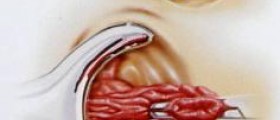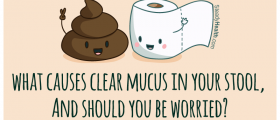Rectal bleeding represents the discharge of fresh blood from the anus. The bleeding may occur spontaneously or is induced by stool when one can notice traces of fresh blood either mixed with the stool or on the surface of the stool. In some cases, patients may even pass blood clots.
Rectal Bleeding is not Something to Ignore
When it comes to rectal bleeding, fresh blood typically points to certain diseases of the rectum. It may also be a sign of some illnesses of the sigmoid colon. In case there is no fresh blood in the stool, but the color of the stool is dark brown, this may point to bleeding from the upper parts of the gastrointestinal tract.
In rectal bleeding, loss of blood may be mild or severe. In case blood loss is severe and rapid, the man soon develops symptoms such as weakness and dizziness, nausea, a drop in blood pressure, and certain cases, he may even faint. No matter what the cause is, any bleeding from the rectum must be reported as soon as possible.

Rectal bleeding in men may be a consequence of numerous diseases.
Anal fissure is a frequent cause of rectal bleeding. It represents a tear in the lining of the anal canal caused by forceful passing of the stool. Constipation commonly leads to anal fissures, and once the problem is brought under control, this tear eventually heals.
Hemorrhoids are another cause of rectal bleeding in men. These are enlarged and dilated veins in the anal canal. Stool, particularly if it is hard may damage hemorrhoids and cause bleeding. Even increased straining during defecation may result in hemorrhoidal bleeding.
Men suffering from an anal fistula may occasionally notice blood in stool. An anal fistula is an abnormal communication between the anal canal and nearby skin. Bleeding in people suffering from anal fistula is caused by inflammation or infection of this abnormal passage.
Diverticulosis and diverticulitis are additional causes of rectal bleeding. This blood is not fresh. Even inflammation of the anus called proctitis in severe forms may result in rectal bleeding. In people suffering from rectal prolapse terminal part of the rectum may be damaged while whipping. This can be another cause of bleeding. And finally, rectal cancers typically trigger rectal bleeding.
To identify the underlying cause of rectal bleeding, doctors may perform a variety of tests and exams. These include anoscopy, flexible sigmoidoscopy, colonoscopy, barium enema, X-ray, etc. Additional tests include a blood count and sometimes a biopsy of certain changes in the rectum.
Treatment depends on the cause of rectal bleeding. It may be treated conservatively and surgically. Once, the condition has been brought under control certain measures must be applied to prevent the potential reoccurrence of the bleeding.
Piles have Medical Solution
Piles, or, as they are often known, hemorrhoids, present one of the most common diseases on the Earth. Basically, piles are a product of bad nutrition and a hard stool following it. This causes overstraining of the anal muscles during bowel movement and the appearance of swelling inside the rectal area or on the surface of the anal area.
Regarding the position of the lump, piles can be classified into several types. Gradually the first type is those lumps inside the anal area, which may bleed but cannot be seen. Secondly, there is a type that can be seen after the bowel movement but returns inside by itself. The third type needs to be placed back after bowel movement since it will hang outside the anal region if left alone. Finally, the fourth type is the external piles which cannot be put inside and are usually the most painful and problematic.
As far as treatment for piles is concerned, patients are due to help themselves and also receive professional help from their healthcare providers. Irritation in the anal area can be avoided with regular warm baths. Additional help is obtained from soothing creams, ointments, or suppositories. Also, one should pay attention and never strain the bowel during defecation.
People who have regular bowel movements and solid but still soft stool can eliminate the stool without additional pressure in the rectal and anal area. Others who are frequently constipated or have hard stool are supposed to take some fiber supplements such as ispaghula husk. They may be additionally prescribed mild laxatives (e.g. lactulose).
If there is severe irritation and pain, doctors might prescribe medications like local anesthetics or corticosteroids. More complex cases of piles need to be treated in a hospital. Nonsurgical treatments like banding or sclerotherapy do not require prolonged hospitalization. There are also infrared coagulation or laser, cryosurgery, and bipolar diathermy, all of which may be engaged in the case of moderate or severe piles.
Finally, if all else fails, patients undergo surgery. Depending on several factors, surgeons opt for conventional haemorrhoidectomy or stapled haemorrhoidopexy. Haemorrhoidal artery ligation is one more highly efficient surgical procedure for patients with severe piles.
- We used a crossectional survey by mail, applying a previously validated self-report symptom questionnaire. Our population comprised an age- and gender-stratified random sample of Olmsted County, Minnesota residents aged 20-64 yr.
- In total, 1643 responded (77%). Rectal bleeding was reported by 235 subjects (age- and gender-adjusted prevalence, 15.5 per 100; 95% confidence interval [CI], 13.6-17.4); 218 found blood on wiping, 74 noted blood coating the stools, and 46 reported dark blood mixed in the stools. The prevalence of rectal bleeding was significantly higher in younger persons (18.9%, 20-40 yr vs 11.3% > 40 yr; p
- Among those with rectal bleeding, 13.9% (95% CI, 9.6-19.1%) had visited a physician for bowel problems in the prior yr; only a history of abdominal surgery was an independent predictor of physician visits but this explained just 15.9% of the deviance.
- www.nhs.uk/conditions/bleeding-from-the-bottom-rectal-bleeding/
- www.ncbi.nlm.nih.gov/books/NBK563143/
- Photo courtesy of Marco Verch Professional Photographer by Flickr: www.flickr.com/photos/30478819@N08/51259025494

















Your thoughts on this
Loading...